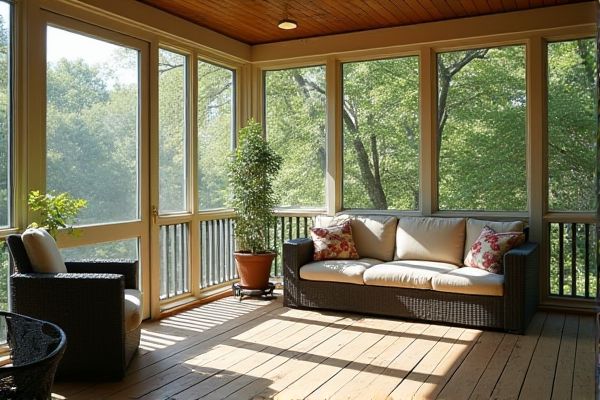
Aluminum screens offer superior durability and resistance to dents, making them ideal for long-lasting porch protection, while fiberglass screens provide better clarity and flexibility but are more prone to tears. Understanding the pros and cons of aluminum screen vs fiberglass screen can help you choose the best option for Your porch; explore the full article for a detailed comparison.
Table of Comparison
| Feature | Aluminum Screen | Fiberglass Screen |
|---|---|---|
| Material | Durable aluminum metal | Flexible fiberglass mesh |
| Durability | High resistance to dents and tears | Moderate resistance, prone to tears |
| Appearance | Metallic, shiny finish | Matte, less visible |
| Corrosion Resistance | Corrosion-resistant, rust-free | Non-corrosive, unaffected by rust |
| Installation | Rigid, requires careful handling | Easy to cut and install |
| Cost | Higher initial investment | Affordable and budget-friendly |
| Maintenance | Low maintenance, easy cleaning | Requires occasional repairs |
| Visibility & Airflow | Good visibility, slightly less airflow | Better airflow, less visible |
| Ideal Use | Long-term durability and strength | Temporary or cost-effective solutions |
Introduction: Aluminum vs Fiberglass Screen for Porches
Aluminum screens offer superior durability and resistance to dents and rust, making them ideal for long-lasting porch protection, while fiberglass screens provide flexibility and a smoother appearance that resists fading and splintering. Fiberglass screens are easier to repair and often more affordable, but aluminum screens excel in withstanding harsh weather conditions and impacts. Your choice depends on whether you prioritize durability and strength or cost-effectiveness and aesthetic appeal for your porch enclosure.
Material Composition and Durability
Aluminum screens consist of thin, woven strands of aluminum metal, offering high resistance to rust and corrosion, making them ideal for long-term outdoor use on porches. Fiberglass screens are made from woven fiberglass fibers coated with PVC, providing flexibility and resistance to denting or crushing but are more prone to tearing compared to aluminum. Aluminum screens typically outperform fiberglass in durability and structural strength, while fiberglass offers better resistance to impact damage and maintenance ease.
Visual Appeal and Transparency
Aluminum screens offer a sleek, metallic finish that complements modern porch designs while maintaining moderate transparency, allowing for clear outdoor views with minimal glare. Fiberglass screens provide a softer, matte appearance that blends seamlessly with traditional or rustic aesthetics, offering superior transparency for unobstructed visibility. Both materials balance visual appeal and see-through quality, but fiberglass screens generally deliver higher clarity and less visual distortion than aluminum screens.
Ease of Installation
Fiberglass screens are lightweight and flexible, making them easier for DIY installation on your porch compared to aluminum screens, which are stiffer and require more precision and sturdy framing tools. Aluminum screens are more durable but often demand professional installation due to their rigidity and potential sharp edges. For quick and straightforward updates, fiberglass screens provide a user-friendly, cost-effective option that suits most porch screening projects.
Resistance to Weather and Corrosion
Aluminum screens offer superior resistance to weather and corrosion due to their rust-proof properties, making them ideal for areas with high humidity or frequent rain. Fiberglass screens, while resistant to rust, can degrade faster under prolonged exposure to UV rays and extreme weather conditions, leading to fraying or discoloration. Your choice should consider aluminum's durability in harsh environments versus fiberglass's flexibility and cost-effectiveness.
Maintenance Requirements
Aluminum screens require minimal maintenance, as they resist rust and can be easily cleaned with soap and water, maintaining durability over time. Fiberglass screens offer greater flexibility and are less prone to denting but may require more frequent cleaning to prevent dirt buildup and potential damage. Your choice depends on balancing durability with ease of upkeep for your porch.
Cost Comparison: Aluminum vs Fiberglass
Aluminum porch screens typically cost between $1.50 and $3.00 per square foot, making them slightly more expensive than fiberglass screens, which range from $0.90 to $2.50 per square foot. Fiberglass screens offer a budget-friendly option with decent durability, while aluminum screens provide enhanced strength and resistance to denting and crushing, justifying their higher price. Choosing between aluminum and fiberglass screens depends on balancing upfront cost against long-term durability and maintenance needs.
Longevity and Lifespan
Aluminum screens typically offer greater longevity and can last up to 20 years due to their rust-resistant and durable metal composition. Fiberglass screens generally have a shorter lifespan, around 7 to 10 years, because they are more susceptible to tearing, stretching, and UV damage. Choosing an aluminum screen for your porch ensures a longer-lasting solution with less frequent replacement needs.
Pest and Tear Resistance
Aluminum screens offer superior pest resistance due to their rigid, durable metal mesh that prevents insects from penetrating while withstanding heavy impacts without deformation. Fiberglass screens, composed of flexible synthetic fibers, provide moderate tear resistance but are more susceptible to damage from sharp objects or pets, leading to potential gaps for pests. For long-term durability and effective pest exclusion on porches, aluminum screens are often preferred because they combine strength with resilience against tearing and intrusion.
Best Applications and Recommendations
Aluminum screens excel in durability and are best suited for high-traffic porches or areas exposed to harsh weather due to their resistance to dents and rust. Fiberglass screens offer superior flexibility and clarity, making them ideal for residential porches where visibility and ease of installation are priorities. Your choice depends on whether you prioritize longevity and protection (aluminum) or aesthetic appeal and cost-effectiveness (fiberglass).
 homyna.com
homyna.com